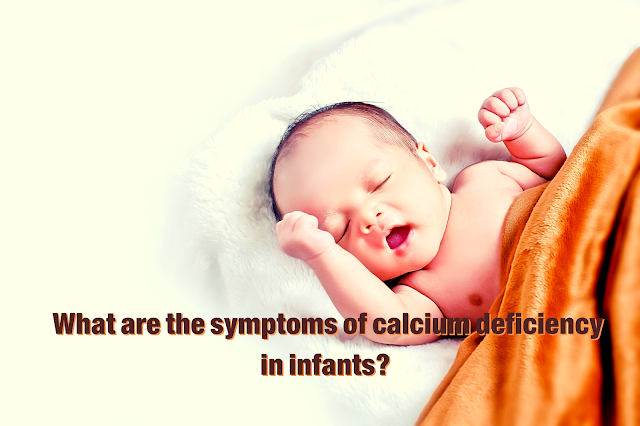As a mother, be sure to get rid of the symptoms of calcium deficiency in infants, as neglecting treatment may lead to complications, as calcium is one of the mineral salts important for the growth of her bones, teeth, heart and also nervousness. the system. .
Causes of calcium deficiency in infants:
We can explain the symptoms that occur to your infant regarding calcium deficiency that occurs for a number of reasons... which we can explain to you as follows so that you know it:
Due to a disorder of the parathyroid glands, the parathyroid hormone maintains normal calcium levels in your baby's blood after stopping the passage of ionized calcium through the placenta from the mother to the infant after birth.
One of the causes of calcium deficiency, for example, is the result of premature birth in the seventh month.
A lack of calcium in your body as a mother or a lack of "vitamin D" also affects the lack of calcium in your child's body.
If you are using certain medicines during pregnancy, such as gentamicin, you should only use any medicine on the recommendation and supervision of your doctor.
In some cases that you experience as a mother during pregnancy such as diabetes during pregnancy or hyperparathyroidism because in these cases you suffer from a high level of ionized calcium in your blood.
In the case of newborn asphyxia that your baby is exposed to, a condition of asphyxia during the perinatal period where the level of the hormone “calcitonin” may rise in the blood, which prevents the release of calcium from the bones and leads to hypocalcemia.
High levels of phosphate in your child's blood cause symptoms of calcium deficiency in infants.
As for the late calcium deficiency in your child's body, he may be exposed to it due to the intake of cow's milk or a formula rich in phosphates.
In addition, feeding a child rich in phosphorous leads to a calcium deficiency.
What is the calcium deficiency that affects your child?
We promised you that we would talk about the symptoms of calcium deficiency in infants, but first we have to explain to you as a mother what condition your child may suffer from calcium deficiency and cause these symptoms. We tell you that calcium is one of the most important nutrients that your child needs to maintain his health and also to build his bones and teeth, in addition to the importance of calcium to strengthen the function of nerves and muscles and help the blood to clot, while activating enzymes that convert food into energy.
Calcium is stored in the teeth and bones of the infant's body to a large extent, but because the child needs this element to support his growth process, he needs constant amounts of calcium, and if this is the portion or amount that your child consumes. Decreased, will suffer from calcium deficiency.
The types of calcium deficiency disease are divided into two types. they :
Early hypocalcemia: It occurs in the first two to three days of the baby's birth.
Delayed hypocalcemia: It occurs during the first week or weeks after the birth of the baby.
Learn about the symptoms of calcium deficiency in infants:
Regarding the symptoms of calcium deficiency in newborns, the deficiency of calcium in your child does not cause obvious symptoms in most cases, from which you can tell that your child has a calcium deficiency.
As these symptoms appear to him only when the level of total calcium in the blood drops to a level below 7 mg/dL or equivalent to 1.75 mmol/L, and also when ionized calcium drops to a level below 3 mg/dL or equivalent . to 0.75 mmol/L.
Symptoms of calcium deficiency in infants, which may appear in some cases, are as follows:
Your child is angry.
Your child has muscle spasms and seizures.
The infant's body trembles or experiences tremors.
He died in a state of lethargy and fatigue.
His heart rate slows down with tachycardia.
Reduction of Blood pressure.
Low muscle tension in your child.
His passing in a state of rapid breathing or even apnea.
Appearance has symptoms similar to those of hypoglycemia.
Calcium deficiency in children and seizures:
In the previous paragraph, we explained to every mother that one of the symptoms of calcium deficiency is the appearance of muscle cramps in your infant, and these cramps occur as a result of the acute deficiency of ionized calcium at a level less than 4.4. mg/dL body weight.
It should be noted that these cramps differ from each other according to their severity and the duration of the cramps period each time. Your child may have these "muscles of the hands and feet" along with cramps of the fingers in some cases as they take on a floppy and rigid position.
Children's Daily Calcium Needs:
As for the amount of calcium your child needs through early childhood, it can vary by age and stage. So:
Calcium requirements for children, age of the child
200 mg daily. Infants up to 6 months of age.
260 mg daily. Children from 7 to 12 months.
700 mg daily. Infants from 1 to 3 years old.
1000 mg daily. Children from 4 to 8 years old.
1300 mg daily. Children from 9 to 18 years old.
How to diagnose calcium deficiency in your child:
When it comes to diagnosing a child with calcium deficiency symptoms in infants, the doctor recommends that you, as a mother, run a series of tests, which include the following:
Primary analyzes such as checking the ratio of "calcium, phosphorous, magnesium, proteins".
Renal performance test.
A blood test is used to determine the acidity of the blood.
Check the concentration of "calcium, phosphorous and creatinine" in the urine.
Thyroid hormone level test.
Checking the amount of "vitamin D" in the infant's body.
Electrocardiography and chest imaging.
In some cases, the doctor may also have to resort to completing the analysis by partial examination.
Here's how to treat the symptoms of calcium deficiency in infants:
After making a medical diagnosis for your child to confirm the symptoms of calcium deficiency in the infant that appear on him and to confirm that he is indeed suffering from calcium deficiency, the doctor will give your child the calcium element that his body needs in the proportions that we explained in previous paragraphs of the subject and proportional to the child's age.
There are many things that you, as a mother, must do to help your child increase the amount of calcium in the body, such as:
Make sure to breastfeed your baby because it is rich in calcium.
If your baby is beyond the period of breastfeeding, give him natural foods rich in calcium while he is feeding, such as “milk, yogurt, hard cheeses such as cheddar, broccoli, cabbage, almonds, sesame seeds, white beans, red beans, chickpeas, oranges and figs. Peach.”
Try to expose your child to the sun as much as possible to increase the level of "vitamin D" in his body that helps absorb calcium, but of course without letting the sun harm him with its strong rays.
You can also "under a doctor's supervision" give your child cod liver oil in very small amounts so as not to poison your child in large quantities.
The thematic paragraphs included an explanation of the case of calcium deficiency that affects infants and children, starting with the causes of this disease and ending with the symptoms that appear in your child and the method of treatment.




Comments
Post a Comment